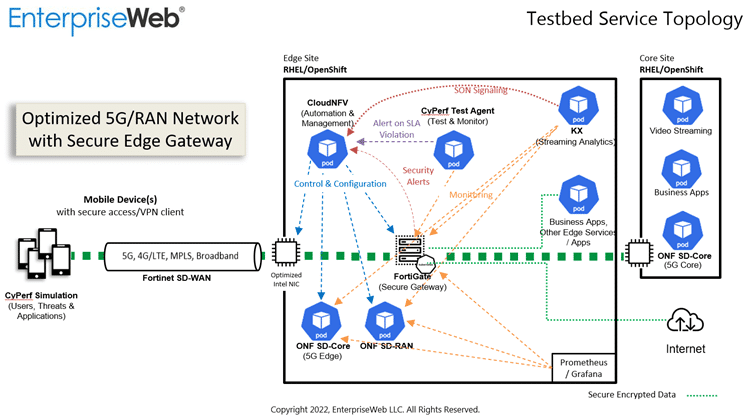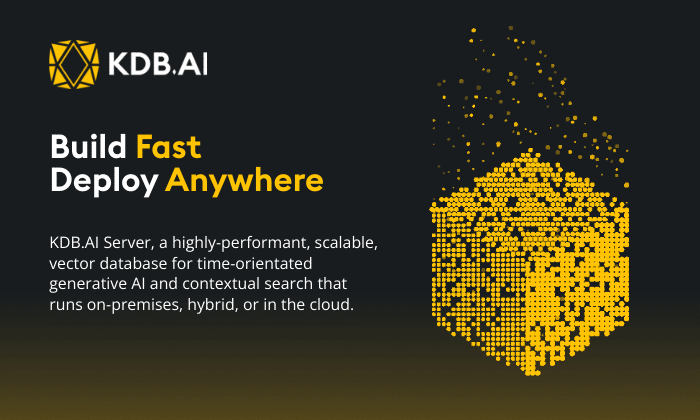by Sarah Gibson
The Wichita Lineman used to worry about snow damaging his network. Since then, it has become a lot more complicated to protect networks. Threats now are more likely to originate from cyber-attacks and bad actors than the vagaries of the weather. Add to that, exponentially growing data volumes, unpredictable bursts in activity, new Cloud and edge-hosted network services, and the challenge of protecting today’s highly-dynamic networks becomes clear.
To address these concerns, network solutions must be equally dynamic in order to ensure consistent services and predictable performance. It’s another vertical use-case where KX can help.
KX is currently participating in a multi-party initiative where its low-latency, high-performance data analytics support closed-loop automation for a self-scaling, healing and optimizing Telecom network. Specifically, KX’s streaming analytics, based on its kdb+ timeseries database, is providing continuous intelligence on network state so the network orchestration platform can take near real-time action to maintain network health.
KX partnered with EnterpriseWeb, a US company leading an Intel testbed based on an SD-WAN connectivity and 5G user-plane security use-case. The testbed demonstrates dynamic configuration of Intel Columbiaville NICs and network functions to optimize processing of secure packets, while reducing resource requirements and energy consumption. The testbed team also includes Red Hat, Fortinet, and Keysight.
In the testbed, EnterpriseWeb provides the intelligent orchestration platform for intent-based network services, while KX provides data services and analytics. Together, the two complementary technologies provide an innovative, modular SON (Self-Organizing Network) with continuous, fine-grained network observability and event-driven automation.
The integration between EnterpriseWeb and KX supports flexible configuration to capture any telemetry and signals so the closed-loop control can co-optimize all the elements of the service, along with the infrastructure it runs on.

The testbed presented two scenarios for the SON. One scenario simulated an increase of network traffic from 1 to 10 Gbps simple increase in network volume. The second simulated a DDOS (Distributed Denial of Service) attack. In both cases, KX monitored the streaming data to issue alerts where threshold levels were breached and send signals back to the EnterpriseWeb’s intelligent orchestrator, which then adjusted the configuration of the testbed components to accommodate the additional traffic and respond to the threat to ensure Quality of Service for customers. Further scenarios will be implemented as part of a multi-phase testbed with the same partners
With KX performing the role of monitoring and anomaly detection, combined with EnterpriseWeb performing catalogue-driven control mechanisms back into the network, this testbed environment demonstrates a full closed-loop autonomous network. Whilst other forms of SON tend to be vendor-specific or domain-specific, this testbed is neither. Not only does it monitor the 5G core and RAN (Radio Access Network), it also offers the ability to monitor cloud infrastructure, customer service, SD-WAN, CDN (Content Delivery Networks), network slice performance and more. This testbed is leveraging a 5G network architecture, but the control loop demonstrated in these scenarios could be used across any form of programmable network, fixed or wireless.
Due to the tiny footprints of KX and EnterpriseWeb, this setup can be implemented at the edge of the network in a distributed architecture model. It also has the possibility of acting as an aggregator to provide centralised processing and training of AI/ML models.
Development at the edge is an exciting opportunity not only for telcos. It has applications across every industry where low latency matters for response and remediation. The demonstration shows that moving processing closer to the source of the data – the “edge” – with timeseries-based technologies like KX can improve response times and increase efficiency.
Click here to view a recent presentation and demonstration of the Intel 5G/edge testbed







